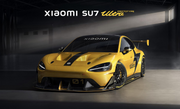
In a bold move that signals the company's commitment to the future of mobility, Xiaomi, the Chinese tech giant known for its smartphones and smart home devices, has unveiled the SU7 Ultra Prototype, a high-performance electric vehicle (EV) boasting 1,548 horsepower. This announcement comes amidst a backdrop where China, once a champion of generous subsidies for electric vehicles, has now shifted gears, phasing out direct financial incentives in favor of a more sustainable, market-driven approach to EV adoption.
The Xiaomi SU7 Ultra, with its tri-motor all-wheel-drive system and an impressive acceleration time of just 1.97 seconds from 0 to 100 km/h, represents the pinnacle of Xiaomi's automotive technology. The vehicle's lightweight design, achieved through extensive use of carbon fiber, weighs in at a mere 1,900 kg, complemented by a race-specific battery pack and braking system that allows for a braking distance of just 25 meters from 100 km/h. The SU7 Ultra's exterior is as striking as its performance, featuring an aggressive stance, a unique "Lightning Yellow" paint scheme, and a fixed rear wing capable of generating a maximum downforce of 2,145 kg.
Despite the discontinuation of EV subsidies, China remains a fertile ground for electric vehicle innovation and sales. The country's robust infrastructure for EVs, including widespread charging networks and supportive policies for green technology, continues to foster an environment conducive to the growth of the electric vehicle market. Xiaomi's ambitious plan to manufacture 100,000 units of the SU7 Ultra annually, with production expected to be completed ahead of schedule by November, underscores the company's confidence in the Chinese market's appetite for cutting-edge electric vehicles.
Xiaomi's entry into the automotive sector is not without precedent. The company's founder, chairman, and CEO, Lei Jun, highlighted the courage and determination required to venture into the competitive world of automotive manufacturing during his annual speech. The SU7 Ultra Prototype is not just a car; it is a testament to Xiaomi's vision of integrating advanced technology with sleek design, aiming to redefine the standards of electric performance vehicles.
As Xiaomi prepares to test the SU7 Ultra Prototype on the famed Nürburgring racetrack in October, a non-mass-produced vehicle showcase, the company's commitment to pushing the boundaries of what electric vehicles can achieve is evident. The mass-produced version of the SU7 Ultra is slated for a Nürburgring trial in 2025, a clear indication of Xiaomi's intention to establish itself as a major player in the global electric vehicle arena.
In summary, Xiaomi's SU7 Ultra Prototype is a bold statement in the realm of electric vehicles, showcasing the company's ambition to lead in automotive technology. Amidst a changing landscape where direct subsidies for electric vehicles are waning in China, Xiaomi's strategic move reflects the growing maturity and self-sufficiency of the Chinese EV market. With a focus on performance, innovation, and a forward-thinking approach, Xiaomi's entry into the electric vehicle space is one to watch closely as the company charts its course in the evolving automotive industry.







